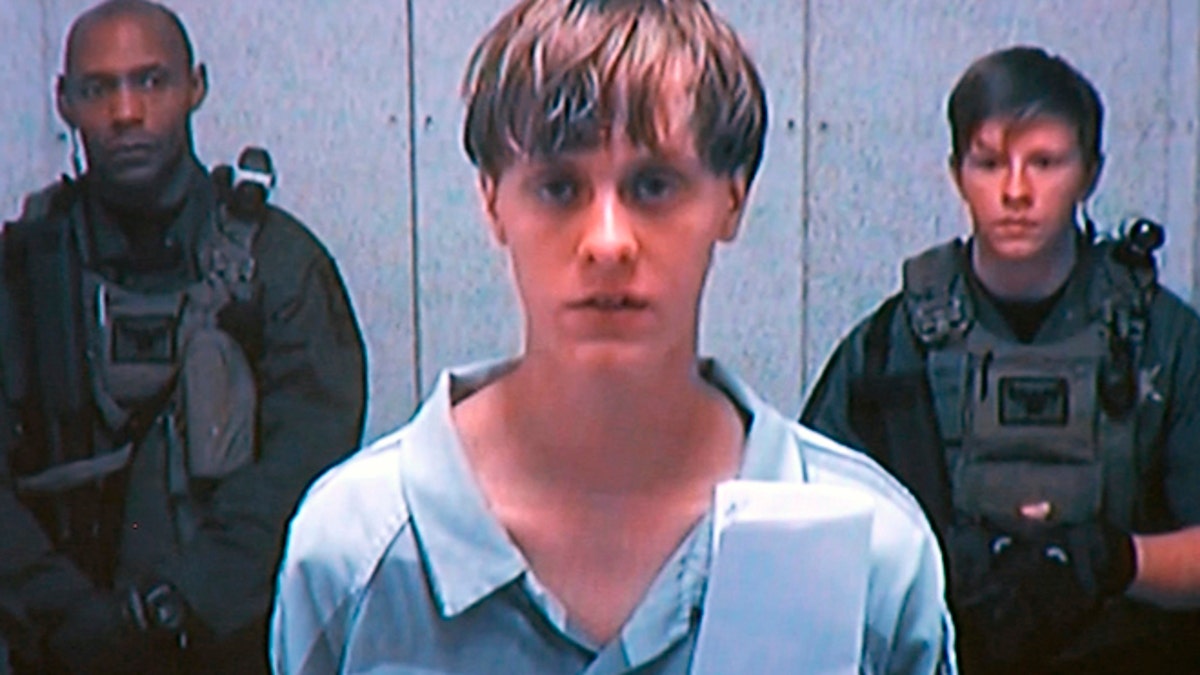
FILE: 2015: Dylann Storm Roof appeared by closed-circuit television at his initial bond hearing. (Reuters)
CHARLESTON, S.C. – The white man accused of fatally shooting nine black parishioners at a South Carolina church began easing into his role as his own attorney Tuesday, although his former defense team began the day by saying it wanted a larger role in the case.
Defense attorneys were demoted to advisers Monday when a judge ruled Dylann Roof could begin representing himself in his federal trial on dozens of charges including hate crimes and obstruction of religion. Against his attorneys' advice, Roof sought to act as his own attorney, giving no reason except the constitutional provision governing defendants' right to a speedy trial.
Roof could face the death penalty if convicted in the June 2015 attack. Police say Roof sat through nearly an hour of prayer and Bible study at Charleston's Emanuel AME Church before pulling a gun and firing dozens of shots. According to police, he shouted racial insults and left three people unharmed so they could tell the world the shootings were because he hated black people.
In court on Tuesday, capital defense expert David Bruck said Roof had given him "general authorization" to communicate with prosecutors on his behalf, particularly when it comes to emailing back and forth about court filings. Jailed during his trial, Roof has no access to email, Bruck noted, so he doesn't have the ability either to receive the documents electronically or share them with his advisers.
Assistant U.S. Attorney Jay Richardson said he had no problem with sending copies of his filings to Roof's team but pointed out that Roof, now acting as his own lawyer, was being kept sufficiently in the loop with paper copies of all filings, a detail with which the judge agreed.
"Mr. Roof has made the decision to represent himself," the judge said. "The standby counsel isn't his co-counsel."
U.S. District Judge Richard Gergel also said specifically he wanted Roof to address him directly in court, not via his standby counsel, whose participation might enable Roof to complain on appeal that the lawyers he fired had done too much.
"Is that OK, son?" Gergel asked Roof.
"Yes," the 22-year-old defendant answered.
So far, 17 potential jurors have been qualified. Once that number reaches 70, Roof and prosecutors can begin whittling the pool down to a jury of 12 members, plus six alternates. A dozen more candidates were expected to be called in Tuesday for one-on-one questioning by the judge.
For his part, Roof participated more in Tuesday's hearing than the previous day, sometimes conferring with Bruck and other lawyers but also consistently standing to address the judge. At times, he objected to juror candidates, including one who answered differently on his questionnaire than he did in court.
"He marked `yes' for every single one ... and then he told you `no,"' Roof said. "So I think he should be struck."
Gergel disagreed on that juror, saying he thought the man had misunderstood the written questions and seemed to be telling the truth in court.
Roof made no objection to a man who said he knew of Roof's standing offer to plead guilty to the slayings in exchange for a promise of life in prison.
"We all know that he is guilty," wrote the man, who was qualified by the judge. "It's just a matter of life or death."
Juror qualification initially began three weeks ago but was halted after Roof's legal team questioned his ability to understand the case against him. After a two-day hearing, Gergel last week ruled Roof could stand trial. Many of those called before the court said they were aware of the competency hearing but vowed that knowledge wouldn't keep them from being able to serve as impartial jurors.

